#film:the king and i
Text
Musical December II: The King and I (1956) - Review
Talked about Anna; now let’s talk about the King.
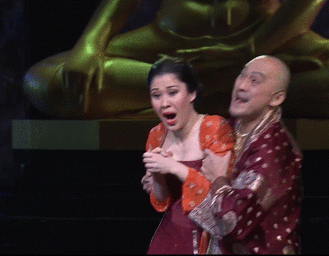
Born on October 18, 1804, Mongkut, or Phra Bat Somdet Phra Menthora Ramathibodi Sri Sinthara Mahamakut Phra Mongkut Phra Siam Deva Mahamakut Wittaya Maharaj (yes, really) was the legitimate son of a prince and princess, and became a Buddhist monk at the age of 20. Rather than immediately ascend to the role of king, he stayed a monk once his father died, and the throne went to an older half-brother of his, who was essentially voted into the position. Mongkut didn’t make any waves because he was cool like that.

When I saw Mongkut became a monk, he went all in on the monastic lifestyle. Traveled the country, strictly followed all of the monk rules, started a religious reform movement that eventually took over the religion for the entire country, yaddayaddayadda. Monk shit. After acting as a monk for 27 years (!), he was granted his rightful place on the throne after his half-brother died. And with that, his grand vision began.
See, YEARS before, Mongkut became the abbot of a Buddhist temple in Bangkok, and pledged himself in a modern education from the Western world. He studied astronomy, English and Latin, theology, the works. Mongkut really was a very educated man, and motivated to be further educated. He actually invited the preaching of Christian sermons IN A BUDDHIST TEMPLE. Dude was cool, is what I’m saying.

In fact, his coolness with the Western world is part of the reason for his succession of the throne. Mongkut beat out 72 other kids for power, and was supported by many members of the government and nobility. At 47, Mongkut becomes king of Siam. He was famous for his pro-British stance, which was notable due to Britain’s influence in the region. Siam’s neighbor, Burma, had been losing territory to the British Empire. Because, y’know, Britain be Britain. But Siam, amongst all of the kingdoms of Southeast Asia, would be the only one to stay independent.
Now king, Mongkut got busy with modernization...and also with not being a celibate monk anymore. Yeah, uh, he immediately gathered a fuckton of wives. And I mean a fuckton. In the end, Mongkut would have 32 wives and 82 children. And this was within only a 17-year reign, meaning he had a child every 3 months! Jesus, man!

Between fucking and...well, more fucking, Mongkut sought to appear as a modern Western nation. This was more political than anything else, as he’d wanted to prevent the nations of Europe from looking down on Siam, therefore preventing it from being colonized. Which, to be fair, definitely worked. This included a few ideological changes in the knowledge of Siam.
Firstly, the world was now officially round, which was squarely against Buddhist teachings. Understand how big a deal this is at the time. This is exactly the same as the evolution vs. intelligent design debate that still rages on in middle America and fundamental Christianity. Or the same as...people who believe that the Earth is flat today. FUCK, I forgot what timeline I lived in for a second, because this one is fucking ridiculous most of the time, Christ.

He continued this trend by having foreign missionaries from the USA and UK teach his family geography, astronomy, and English. He even was...relatively feminist. He released some of his concubines, ended forced marriage practices, and also ended the practice of using women as literal currency. Which, yes, was an actual thing at the time. So...kudos for that? Yeah, it’s below the very the bare minimum, but it’s at least an improvement.
But in the process, he still embraced Siamese culture through wardrobe and practices. He was still mostly faithful to his country and its beliefs, and he made that known to foreign emissaries. This culminated in the Bowring Treaty, which saw British emissaries from Hong Kong visit for economic trade reasons. See, traditionally, any member of the Siamese state would be threatened with torture for trading with foreigners. Which is, yeah, a LOT. But with an increasingly globalized world, that practice wouldn’t be sustainable for long. The Bowring treaty began trade agreements with Siam and Britain, and this began some revolutionary changes for the southeast Asian country over the next decade.
And now...enter Anna Leonowens.

Anna Leonowens came to Siam in 1862, and was hired as an instructor for the royal family. Which, again, was a super common practice at the time. Anna would end up making a lot of claims about her time there, most of which were heavily influenced or generally incorrect. For example, the Uncle Tom’s Cabin thing? Nope. Slavery was more like indentured servitude in Siam, for starters. And secondly, that practice would be ended 40 years after her visit there. So, yeah, Anna’s influence wasn’t really a part of that.
Secondly, the war elephants thing, much to my eternal regret, never happened. He never offered elephants to Lincoln to fight the Civil War. The letter was actually sent to James Buchanan, and just detailed a gift of normal elephants, for the purposes of breeding. I mean, if Jefferson can get a huge block of cheese, then Buchanan could get elephants. And it might’ve broken the ecosystem...but in an alternate universe, the USA is just a little bit crazier.

Lastly, Mongkut obviously didn’t die of a broken heart, for God sakes. Dude died of malaria after going on an expedition to watch a solar eclipse which he accurately predicted. Because Mongkut was an intelligent boss of a human being, and an absolutely brilliant man. And he wasn’t a vicious and violent barbarian trying to play at being a sophisticated Westerner. He didn’t need to be a Westerner, obviously. Dude was just a fascinating individual.
Which is probably why Thailand HATES Anna Leonowens.

To be fair, a lot of this has to do with the concept of lèse-majesté, which is the crime of saying that royalty or leadership sucks. We may shit all over America, but at least I have the ability to say Donald Trump was an absolute utter piece of shit without dealing with repercussions from the government. Freedom of speech and all that. To this day, in Thailand, any defamation against the royal family is straight-up illegal. Thailand is the only country with a constitutional monarchy to be heavily enforcing this law to this day. You can get three to fifteen years for speaking against royalty, with the most recent sentence from this year being a woman serving 43 years in prison! Christ, Thailand, what the hell!
Today, every single iteration of Anna Leonowens’ story is banned in Thailand, from the books to the play to the movies. This is, obviously, because of offense taken on behalf of Mongkut, and I don’t know if they’re wrong about that. Fact of the matter is, this franchise does represent a Eurocentric depiction of a foreign culture, and to problematic degrees as seen from a modern context.
But, uh...it’s still a great musical.

Yeah, the funny thing about problematic material is, while it deserves to be lambasted for its retrospectively negative qualities, it doesn’t mean that it doesn’t have good qualities! And maybe that’s a controversial viewpoint, but it’s how I feel. For example (and PLEASE hear me out, I beg of you), I still think Bill Cosby’s standup is genuinely funny (especially Bill Cosby: Himself), and The Cosby Show is a classic American sitcom that changed the way Black Americans were viewed, and how they viewed themselves. As a Black American, that show meant something to me and to my family. However, Bill Cosby? Still a rapist and a monster who hid behind that folksy image for decades. Yeah, he’s still absolutely a hypocritical piece of shit, but the man made good comedy, is all I’m saying. This is not an excuse for the man’s actions, just an acknowledgement of the quality of his work.
And hell, we accept a lot of problematic material in some of the greatest films ever made, because we recognize the quality of the film itself. Leon the Professional, as I discussed earlier this year, has some REALLY uncomfortable shit revolving around Natalie Portman and Jen Reno’s relationship, but it’s a good action film regardless. West Side Story is considered one of the greatest musicals ever made (and for good reason), but heavily features white actors dressing up as Hispanic characters, including the main Hispanic character. And Gone with the Wind is considered one of the greatest films ever made, despite having some of the most offensive stereotypes I’ve EVER fucking seen. Also, real talk, that movie pisses me off.
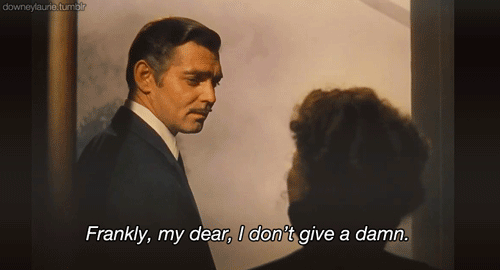
Recognize the problems, and try and see beyond them.
Yeah, this movie is historically inaccurate, technically features yellow face (yeah, uh, didn’t even talk about THAT bullshit, but Yul Brynner’s obviously not Thai), and is understandably banned in Thailand...but shit, it’s still a good movie. Perfect? Well...no. Definitely not perfect.
But let’s get into it, huh? Part One and Part Two of the Recap are right here!
Review

Cast and Acting: 8/10
Let’s talk Deborah Kerr first, because she is great as Anna Leonowens. Calm but strong, she gives the character the energy she needs, and is convincing as a caring teacher, single mother, and strong woman of the world that values herself and her beliefs. Seriously, Anna’s great, and Kerr does an excellent job playing her...during the speaking scenes. The singing belongs not to her, but to Marni Nixon, famous ghost singer and an excellent one at that. Check out my Recap of Singin’ in the Rain for more details about her and ghost singers. The supporting characters are also of note, even though I wouldn’t say they’re...great? Rita Moreno is playing Tuptim, and she’s not too bad. Same with Terry Saunders, Patrick Adiarte, and Martin Benson, who might actually be my favorite of the supporting cast. Didn’t talk about the Kralahome much, but he’s an interesting character who could’ve been used a bit more. But, uh...let’s get to the main event.
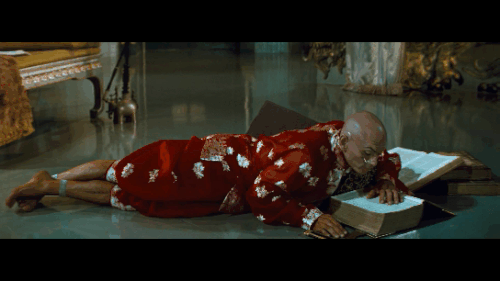
Yul Brynner is both amazing and...not amazing.
Genuinely, Brynner makes Mongkut the best character in the film, and absolutely the most entertaining when he comes on screen. And yeah, I mean that. Mongkut, inaccurate though he may be, is a fun character to watch, if not also somewhat frustrating. Which is likely the point. And Brynner tows the balance extremely well most of the time. His singing is...not great. It’s not great. And most importantly...he’s not Thai. Yeah, like I said above, I may not have mentioned it in the Recap, but it’s REALLY obvious. It was the times, I get that, and diversity in Hollywood was low, so I can somewhat forgive the movie for that. But it does get awkward, is all I’m saying. Brynner won Best Actor for this and...yeah, I didn’t get it at first, but with some time since watching the movie, I can acknowledge that he did an excellent job. So, yeah, he’s A Puzzlement, for lack of a better word.

Plot and Writing: 8/10
Honestly, this is a good story. Simple, but a good one that you don’t see too much. It should be an overwrought plot, but this film somehow makes it seem fresh? Obviously based off the semi-fictional books by Anna Leonowens and Margaret Landon, then adapted to film by Ernest Lehman, this is a well-written story and script...that’s clearly a stage musical. Yeah, uh, this is pretty obviously a Broadway musical adapted to film, in a way that Singin’ in the Rain and West Side Story aren’t. That, to be fair, may be due to the acting and direction, but the screenplay definitely doesn’t mess with the play’s script much. Or at all. And with that said...

Directing, Cinematography, and Production Design: 10/10
Oh, yeah, I changed this category then I realized that Production Design should just go here. Anyway, that point I made about the adaptation from stage to film? Yeah, Walter Lang did film this as a play, but added film flourish to it throughout. And it really works. Like, it REALLY works. Lang does a great job, as did cinematographer Leon Shamroy, because some of the shots are framed beautifully. Finally, the production design is absolutely gorgeous. It’s beautiful and well done, from costumes to sets. Absolutely no complaints, and there’s a reason this film won Oscars for Best Art Direction and Best Costume Design (for Hollywood legend Irene Sharaff)!
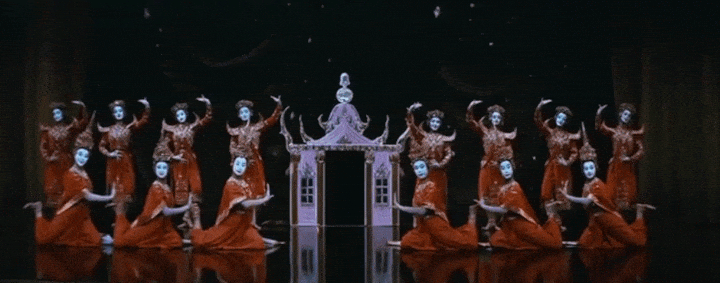
Editing: 9/10
It’s very well done and well-paced! No complaints, and few comments for this particular category. Credit to Robert Simpson, and to Carlton Falkner for sound recording (which is very well done, especially for the 1950s)!

The Songbook: 9/10
And here we are again, because this songbook is wonderful...for the most part. Where Singin’ in the Rain has a 100% iconic songbook, this one is...less so. It’s like 90% iconic. The instrumental scores are great, and the memorable songs are memorable. I’ve had “Shall We Dance” stuck in my brain for DAYS since I’ve seen this film, and “Getting to Know You”, “Whistle a Happy Tune”, and “A Puzzlement” are all very memorable parts of the score as well.
And the rest...eh? I feel like I should like both “Something Wonderful" and “Hello, Young Lovers" a lot more than I do, and while they’re good songs, I don’t remember them. Like, AT ALL. Completely wiped from my memory. And I literally forgot about “We Kiss in a Shadow” until typing this! Honestly, this might just be a me thing, but...eh?

88%, et cetera, et cetera, et cetera.
I do think this is a good movie, and I’m glad that I’ve seen it! However...it’s not in my top 5 live-action musicals. Yeah, sorry. It is good, and I’d be more than happy to watch it again, but it’s not my favorite. Who knows, though? Maybe I’ll watch it down the line and gain some new appreciation for it. I could see that happening with this one.
OK, what’s next on the list of musicals I should’ve seen by now? Let’s do another movie with Marni Nixon ghost-singing, because I can’t think of a better excuse to talk about another musical I should’ve seen by now.
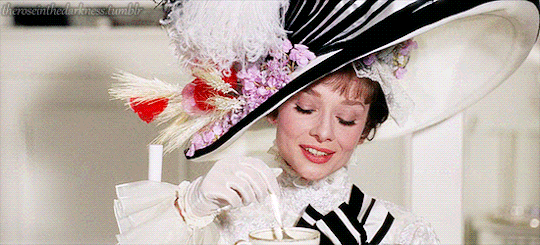
Next: My Fair Lady (1964); dir. George Cukor
#the king and i#the king and i 1952#film:the king and i#walter lang#rodgers and hammerstein#deborah kerr#yul brynner#rita moreno#martin benson#user365#365days365movies#365 movie challenge#movie musical#musical film#musical december#musicember
30 notes
·
View notes
Text
Film:The Man Who Would Be King -1975

The Film is a Flash Back where one of the character comes back to the Witness who helped them out along the way to tell the story.
The Film shows how power can corrupt an individual and cause them to lose sight of their true goals/intentions, and lose bonds that was hold deeply by both sides.
The Film is shown with a narrator so its makes the movie into a book and we are following the characters on an adventure this makes us feel like we are there with them making us part of the adventure. As the narrator helps to direct where the Film is going we go along with it.
I like the Diegetic music in the film as this makes the environment they are in more lively it also bring the audience into the film. This can be seen at the start of the film where you are in a Market place and people are performing.
I really like the movie as its has a great sense of humour, its very simple as its an straight forward adventure. The way the movie gets the viewer excited and relatable.
Rate 4.5/5*
1 note
·
View note
Text
Musical December II: The King and I (1956) - Recap: Part One
This one might be a bit...problematic.

I calls it as I sees it...even when I haven’t seen it. Look, I’m always wary about American musicals from before 1980 that take place in foreign countries, and this is no exception. Especially because this one is based on a true story...that’s been heavily altered for reading and viewing audiences. And now I’m getting The Danish Girl flashbacks. Hoo boy.
So, just like I did with that film, it might be a good idea to look at the origins of this film from a historical standpoint. But first, let’s look at the origins of the musical itself, not the true story. So, to go answer that question, we’ll need to go back to Anna Leonowens and Margaret Landon.

In the 1860s, English tutor Anna Leonowens returned from the kingdom of Siam (which is now Thailand), after living there for five years. She’d been hired by the king at the time, Rama IV, or Mongkut. Afterwards, she wrote and published two books in the 1970s: The English Governess at the Siamese Court and Romance of the Harem. Both of these were stories about life in the royal palace, as told through Leonowens’ eyes.
Then, in 1944, American author Margaret Landon read these books, and combined them into a biography detailing Anna’s life in the kingdom, taking care to combine knowledge about the kingdom and its cultures as well. She called the biography Anna and the King of Siam, and it was a smash. In 1946, the film was made into its first adaptation of the same name, which starred heavy hitters like Irene Dunne and Rex Harrison in the starring roles.

Then, in 1951, Landon was approached by legendary musical makers Richard Rodgers and Oscar Hammerstein II, fresh off of their huge success, South Pacific (which I’ll get to, I promise). They asks landon for the opportunity to turn her book into a smash musical, and she sold them the rights to do so! And thus, Broadway saw the debut of the team’s fifth musical, The King and I, on March 29, 1951.
For their Anna, they had Gertrude Lawrence, and she would be followed by a veritable who’s who of successors over the years. But who would play the King himself? Well, who better to play a Thai king than Russian-American theatre actor Yul Brynner? Naturally. Also, you may know Brynner from this performance:

Or maybe, you know him from something a little more classic Hollywood.
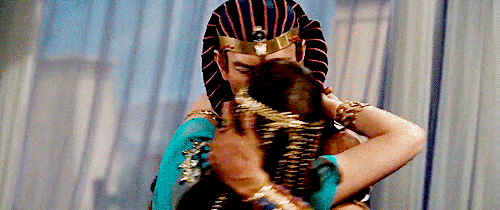
Neither of which, of course, would have been possible if Brynner hadn’t made himself known as Mongkut on stage. In fact, he was so very renowned as the character, he was given the opportunity to play him in the 1956 adaptation, alongside Deborah Kerr as Anna. And just like the musical, the film was a massive hit! And, of course, that’s what I’m watching today.
After this film was released, Anna and the King of Siam was adapted into a television series in 1972, an absolutely horrible animated film in 1999, and another film that same year. And all of that would be well and good, except for one minor problem.
Both Anna and Margaret may have...exaggerated a little.

But that’s a topic for the second part of this Recap. Let’s just get started on Part One, shall we?
SPOILERS AHEAD!!!
Recap: Part One
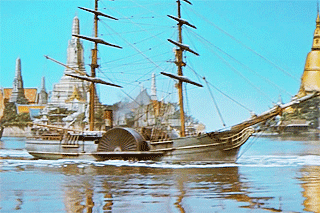
It’s the 1860s, and the widowed Anna Leonowens (Deborah Kerr) and her son, Louis (Rex Thompson) have arrived from the United Kingdom to the kingdom of Siam (now called Thailand), in order to serve as a schoolteacher. She is to work under the purview of the King, and has arrived in the harbor. However, the ship is greeted not by the king, but by his chief advisor, the Kralahome (Martin Benson).
Louis, in these unusual surroundings and faced by the severe-looking Kralahome, tells him how worried he is. TO calm him (and herself) down, Anna performs the same ritual that I do to calm herself down: she whistles (“I Whistle a Happy Tune”). So, whistling means that Anna’s freaking the fuck out; got it. This is interrupted when the Kralahome comes on board.
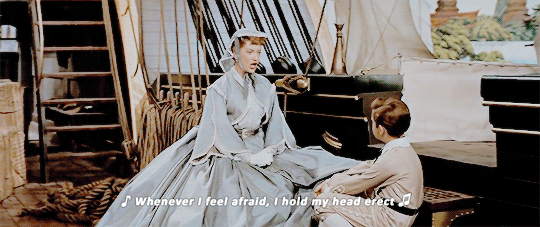
Anna is, apparently, meant to be the English tutor of the king’s children. She is also widowed, with her former husband being an officer of the British army. But where and how he died is concealed, so I can only assume that he died in a scuffle related to Thailand. A translator acts as a medium for the Kralahome, who soon reveals that he can speak English (after kicking the translator; dude’s a dick).
Seems that the King is having Anna live in the Royal Palace, rather than in her own house as promised. The Kralahome tells her to take it to the King, and she agrees. He escorts her through the city, and eventually to the palace. The city itself looks quite beautiful, if not a little stereotypical, and the palace shares that description. On the throne, having a shitty day, is the King of Siam, King Mongkut (Yul Brynner).

Mongkut is being visited by Lun Tha (Carlos Rivas), an emissary of Burma (now Myanmar), and is being presented a gift in the form of a woman, Tuptim (Rita Moreno). Which, yeah, rubs both Anna and me badly, but it’s the times and it’s the culture...I assume. After this meeting, visiting hours are concluded. That absolutely pisses Anna off, and she goes to meet him anyway.
Although initially frustrated, he listens to her...kinda. She tries to raise her issues, but he basically ignores her and asks her questions, like her age and years of marriage. She lies about the former, and says she’s 150 years old. Mongkut accepts her present and brings her to meet his multiple, MULTIPLE wives. This includes Tuptim and his head wife, Lady Thiang (Terry Saunders), who speak some English. Mongkut decides that she will teach them the ways of the “modern world” alongside his children.

But, of course, this doesn’t solve the whole “house” problem. Anna finally brings it up, but Mongkut counters that it’s an honor to live in the palace. Still, she objects, and threatens to leave. But before she does, Mongkut has her meet his children, whom she’ll teach (“The March of the Siamese Children”). And I gotta say...these are some cute kids. Devious, man, using children as weapons to get her to follow your conditions. If I were in this situation, I’d be fucked.
A bunch of these kids have some legit personality in their entrances, and I’m genuinely impressed by their characterization. One of these children is Prince Chulalongkorn (Patrick Adiarte), the son of Mongkut and Lady Thiang. And by the way, dude has a LOT of children, with 67 outside of the children seen here. Just like me, Anna’s won over, and she moves into the palace with the help of the wives.

Anna quickly makes herself known to the wives as not only a proper lady, but also as a feminist. An 1860s feminist. Talk about being ahead of the times. This, Thiang says, would make Mongkut angry, as he’s a classic meninist. While unpacking her belonging, the troubled Tuptim asks for books to read in English, while also admitting that she was taken away from her true love, Lun Tha. Anna notes that she understands how it feels to have a loved one taken from you, and follows it up with a lovely song about her late husband and young love (“Hello, Young Lovers”).
As time goes on, the lessons continue. Mongkut speaks with the Crown Prince about his lessons, including the fact that the world is round and spins on an axis, and not that it rides on the back of a turtle. Which sucks, because the turtle thing would be sick if true. Like, come on, being on top of a turtle? I would go to the location where I could pet the turtle as soon as possible. And how would that work, from a physics standpoint? I don’t fuckin’ know, I just want to be on top of a giant turtle! Some real Discworld shit there, and I can dig it.

Anyway, Mongkut agrees about the “round earth” thing, but implies that he doesn’t know that for sure. The Crown Prince is confused, as the King is supposed to know everything, not just guess at it. Mongkut says that when he becomes King, he WILL know everything. But once the Prince leaves, Mongkut has his own doubts about this. And, uh...it’s a great song (“A Puzzlement”), don’t get me wrong...but Brynner isn’t the best singer. Still, his acting sells the song.

From Mongkut’s existential crisis, we go to the lessons of the day. Thiang introduces it with the current map and knowledge of their neighbors, including Burma. They believe that SIam is massive, and that Burma is this tiny, poor, shit country with a tiny, poor, shit ruler. But Anna steps up and IMMEDIATELY clowns all over Thiang with an updated map, showing that Siam is...well, it’s pretty fuckin’ tiny.
Obviously, this doesn’t initially sit well with the Crown Prince, but she insists that England is even smaller, which it is. She also says that she’s grown to love Siam in her time there, and that leads to arguably the most famous song of the musical: “Getting to Know You”. And Anna’s dance with the kids, fuck me, is cute as shit.
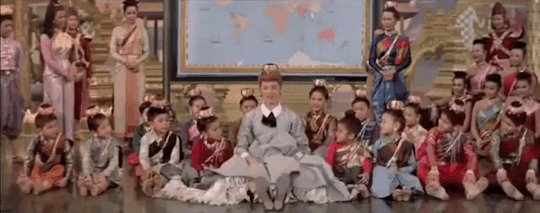
However, that lesson is IMMEDIATELY derailed after the song, when Anna tries to teach the children about snow. They don’t believe the existence of snow, and that leads them to their disbelief in the size of Siam. This is interrupted by the King, who chides the children for their disobedience. During this speech, he notices the book given to Tuptim by Anna: Uncle Tom’s Cabin. UNCLE TOM’S CABIN?!? Jesus, Anna!
Looks, the Stowe-written novel is a fantastic book, and it should be read, then and now. But bringing an anti-slavery pro-abolitionist book to a country WELL-KNOWN at the time for having slaves, was a RISKY fucking move at best! This prompts a conversation about slavery, the moral responsibility of rule, and the currently occurring American Civil War. It also brings up an interesting question.
What if Lincoln fought the Civil War...with elephants?

Abe, buddy, hear me out. I love this idea. Can you imagine what the war would’ve been like if Lincoln told his cabinet members to import elephants? In that creaky voice of his, just saying, “I do not care about the expense, I want 4 score and 20 elephants here as soon as possible. We will use them to win this odious Civil War, and bring us all together under one flag once again.”
And Hamlin would’ve been like, “Elephants, Mr. President?” And while the rest of the cabinet’s thinking about it, Grant’s just fuckin’ buzzing in his chair, like “FINALLY MOTHERFUCKER GET ME ON THOSE FUCKIN’ BAD BOYS” And then, a little while later, David gets a message from the front of Gettysburg, and all it reads is “FUCKIN’ ELEPHANTS MAN!!!!” You get those photographs of the Union Army lineups, but there’s an elephant in the background! And every fucking platoon has their own elephant WHY DON’T I LIVE IN THAT UNIVERSE GODDAMMIT

Just saying. It’d be great.
Anyway, after the lesson concludes, the Kralahome shows up to tell Anna that she’s stupid, her lessons are stupid, her culture is stupid, and she’s totally gonna be a slave like the rest of them one day. Good talk, dude. That night, Anna’s summoned to speak with Mongkut, and he has a short philosophical talk with her, while asking her to write a letter to Lincoln about elephants. And again, gotta say, I’m with him on this one. He also tells her not to hold her head above his at any point, but...elephants, man.
After that, she takes off and runs into Lun Tha, there to meet Tuptim under the cover of darkness. The lovers sing a ballad together (“We Kiss in a Shadow”), and pledge to meet each other again soon. Good timing, because trouble is coming to Siam, and will distract the King from their affair.

The Kralahome brings news that an English report is going around, claiming that the King is a barbaric ruler. This danger riles him up, and he goes to confront Anna, whose command of the children singing about a house is irritating him. This, is seems, is a passive-aggressive move by Anna in regards to the promised home. The King claims he doesn’t remember this promise, and she insists that she must leave the kingdom if she has no home to live with her son. They argue, Mongkut tells Anna she is a servant, and Anna leaves in protest and distress.
That night, she’s approached by Lady Thiang, who begs her to speak with him, both about their argument, and about the rumors from England (“Something Wonderful”). The song wins her over, even though it kinda describes an abusive domestic relationship? It’s a lovely song, but it is basically saying. “Sure, he’s a dick most of the time, but he does nice things sometimes, and he needs me to love him.” Yeah, uh, yikes buddy. Problematic, but admittedly of the times.
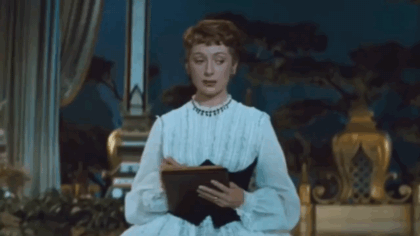
Part One over, et cetera, et cetera! See you in Part Two!
#the king and i#the king and i 1956#film:the king and i#walter lang#rodgers and hammerstein#deborah kerr#yul brynner#rita moreno#martin benson#user365#365days365movies#365 movie challenge#movie musical#musical december#musicember#Musical film
15 notes
·
View notes
Text
Musical December II: The King and I - Recap: Part Two
So, what’s the actual story of The King and I?
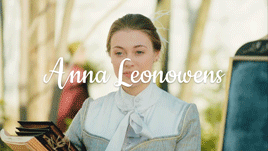
Well, first things first, let’s talk about Anna. After all, she wrote the original book, right? Anna Leonowens was born in India in 1831. This was a part of her origin that she regularly hid, claiming instead to have been born in Wales. She was also probably mixed, through her maternal grandmother. That’s unverified, though. In any case, Anna’s father was a hotel manager who died real quick, and she lived with her mother and siblings in abject poverty in India. Again, she would deny this part of her past.
Her mother remarried shortly after her birth, and her stepfather was extremely abusive towards her. This abuse may have ranged from emotional to sexual, but there are conflicting reports on that front. In any case, Anna got the fuck out of there at 14, and eventually met her future husband, Tom Leon Owen. Rather than being a British officer like she claimed (and as is said in the book and musical), he was a fairly dull man, with far less intellect than the well-read Anna. After several miscarriages, the two had two children...and no money. And then Tom died in Singapore.

Yeah, Anna’s now living with her kids in Singapore, with no money, no support, and no luck whatsoever. She also didn’t really talk to British people much, possibly because of her mixed-race status. Instead, she spent her time with American ex-pats, and that would set the stage for her post-Thailand life. She was a huge fan of abolition, and she approved of both women’s rights and the abolishment of slavery. So, yeah, accurate there.
Then, after she’d taken up a job as an English tutor, a friend of Anna’s informed her of an opportunity in Siam as a tutor. She took it, and went with her son Louis to Thailand, calling herself Ann Leonowens and reinventing her backstory entirely to get the job. She claimed she was from England (nope), was the widow of a war veteran and officer (noperino), and was three years younger. Weird choice there, but OK. And at this point, you might have noticed something.

Fitting, since the stage is now set for Anna’s visit to the court. But I’ll save that for the Review section. See, Anna’s account of Mongkut is apparently so very inaccurate, the book and all adaptations of it are and always have been banned in Thailand. Whoof. Fuckin’ whoof, man.

So, for now, let’s go back to the fictional Thailand with Part Two of this Recap! Part One is right here!
SPOILERS AHEAD!!!
Recap: Part Two

Having been moved by Thiang’s song about abusive relationships, Anna reluctantly goes to speak with Mongkut. When she shows up, he assumed she’s there to apologize, and she just fuckin’ goes with it. With very little prodding, Anna gets him to tell her about the message from England, and of his false reputation as a barbarian.
He backhandedly asks Anna for advice, asking her instead what she guesses he will do. And she tells him that she THINKS he would invite the incoming emissaries to a banquet, served in the European style. After all, the European style is...civilized...guuuuuuh. Yeah, it’s the whole “cultures that aren’t British aren’t culture” shit from this time period. Colonizing, imperialist, racism, et cetera, et cetera, et cetera. You get the idea.
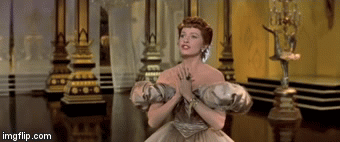
Mongkut agrees to this, and sets out to prepare a banquet and performance for the visiting British ambassadors. And in return, after another backhanded set of insults towards Anna during a prayer to Buddha, he promises her and her son a house, as they’d originally agreed. And with that, the preparations are made.
One week later, the kingdom is all prepped for the visit of ambassadors Sir John Hay (Alan Mowbray) and Sir. Edward Ramsay (Geoffrey Toone). The latter is and old friend and old flame of Anna’s, and is thirsty as hell for her. That fact makes Mongkut extremely jealous immediately, but they mostly get past it as the banquet begins.

While a group of guys do Muay Thai outside, the banquet soon turns into the performance of the night, that being a Thai ballet version of Uncle Tom’s Cabin. Yes, we’re doing this. As fucking weird as this idea is, it’s also a genuinely good performance (“The Small House of Uncle Thomas”), as well as being an interesting interpretation of an American story through the eyes of a completely different culture. And then, consider that this cultural depiction is actually the depiction of Thai theatre from an American perspective, and that’s even more interesting. I’d love to see a version of this that was made by a Thai director. Odds are SUPER high that that won’t ever happen, but a dude can dream.


But Tuptim uses this to pass along her political message: FUCKING LET ME GO HOME! Yeah, she basically says that directly to him at one point, which pisses him off. What’s made worse is the fact that the story ends in the death of the slave owner, which is obviously an allegory for Mongkut himself. Yeah, Tuptim might’ve fucked up there, real talk. The performance ends, everybody but Mongkut claps, and Tuptim gets the FUCK OUT OF THERE! The entire performance was an excuse for Lun Tha to get her out of the palace. Clever, I gotta say. After the banquet, Anna goes to speak with him, and shares her appreciation for the night and for Mongkut’s efforts. He, in turn, shows his appreciation with a beautiful jeweled ring. Before they retire for the night, he tells Anna that an albino elephant has been born, and this is seen as a good omen for the future.
However, he’s still upset about the play and Tuptim. He reveals that she can’t be found, which only somewhat surprises Anna. She tells him that she was unhappy, and that she was little more to him than an object or a prize. And yeah, he doubles down on that shit. What follows is his personal philosophy, which is...I mean, dude owns a harem of women, it’s exactly what you think it is (“Song of the King”). Anna counters with the traditions of the English. And of course, this results in the other most famous song from this musical: “Shall We Dance?”.

It is a lovely song, a lovely dance, and a lovely scene.
And it’s completely destroyed by what happens next. The Kralahome bursts in, with the news that Tuptim’s been found. They drag her in, under accusation of infidelity with Lun Tha. The punishment is whipping, much to Anna’s horror. But goddammit, the king of Siam will NOT be cuckolded in his own castle! HE WILL NOT BE A BETA CUCK!

Anna stands there, resolute in her opposition, and accusing Mongkut of have no love in his heart, and of being the barbarian the English believe him to be. And with that...he leaves just before he’s about to whip her. An advisor comes in right afterwards to reveal that Lun Tha is dead, and the Kralahome tells Anna that her stupid compassion has destroyed Mongkut. She runs away in tears, planning on taking the next boat out of there.
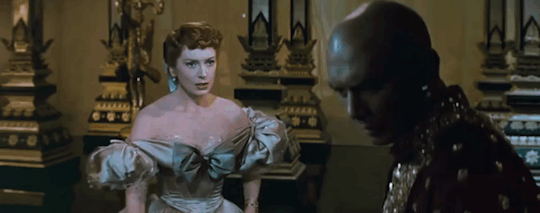
Weeks later, as her belongings are packed, and as she plans on leaving the kingdom, she reminisces on her good times there. In the process, Thiang and the Prince arrive to tell Anna that Mongkut is suddenly and unexpectedly dying. Apparently, he has a broken heart from the events of that night, and it’s so fucking bad that he’s literally dying? Fuck, I guess the doctors have just given up!
Upon hearing of Anna’s planned departure, he wrote a letter to her under great duress. She reads it and cries, upon realizing that the King really did respect her greatly. Bygones are bygones, and Anna goes to visit the ailing Mongkut. On his deathbed (and still complaining about relative head height), he gives back to her the ring she’d rejected after the whipping incident.
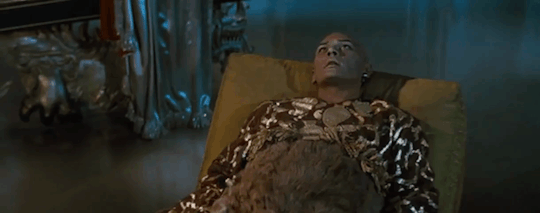
His numerous children are brought in to the room, and one of them begs Anna to stay in a very heartfelt plea. She agrees, for the sake of the children, and Mongkut gives her a raise. Also, damn, dude doesn’t seem like he’s dying. Just tired and kinda pissed. Still, he officially passes on his title to the Crown Prince, who makes a few proclamations. One, fireworks and boat races for New Years’. Priorities, kid, you’ve got them right. Secondly, et cetera, he ends the custom of bowing to a king.
And with that, Mongkut just...dies (“Finale”). And the movie ends.

Well...damn. See you in the Review!
#the king and i#the king and i 1952#film:the king and i#walter lang#rodgers and hammerstein#deborah kerr#yul brynner#rita moreno#martin benson#user365#365days365movies#365 movie challenge#movie musical#Musical film#musical december#musicember#mygifs#my gifs
7 notes
·
View notes